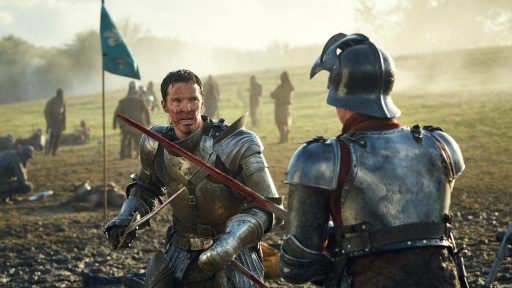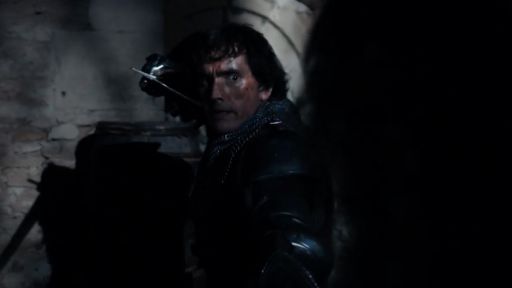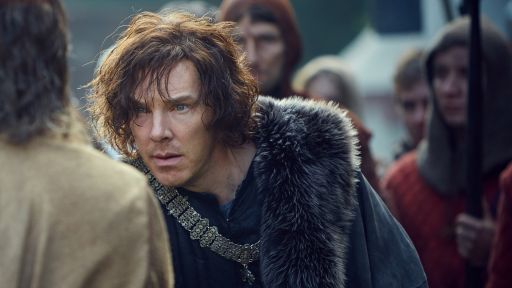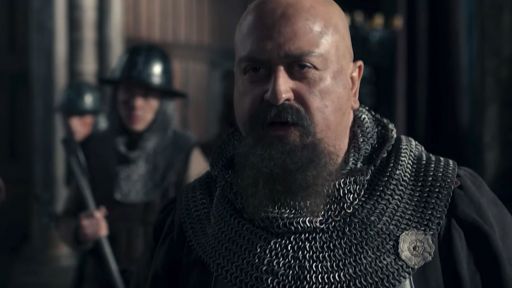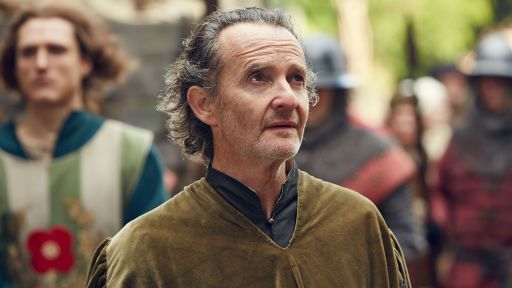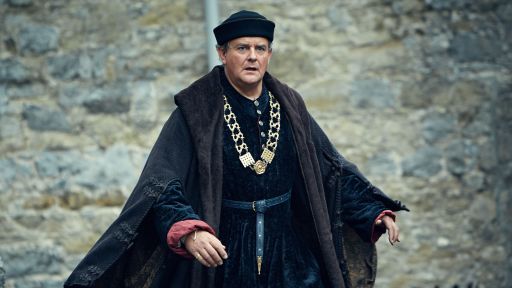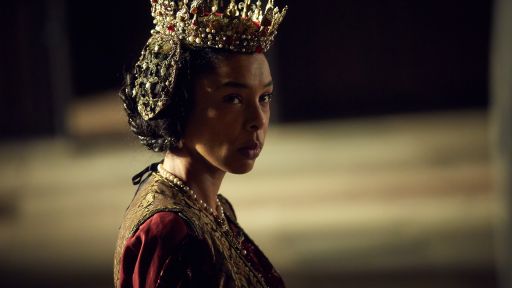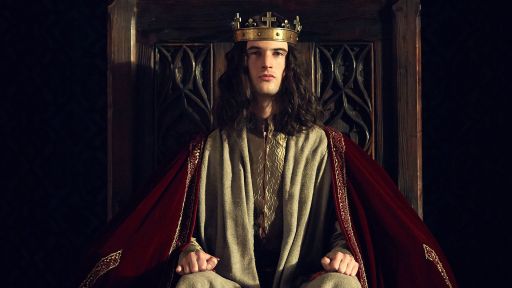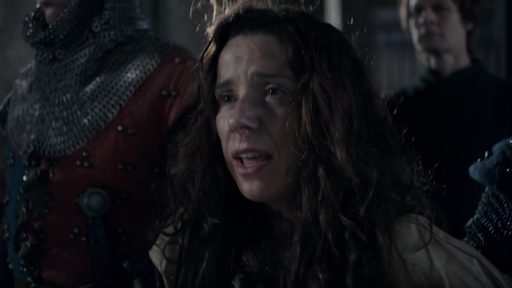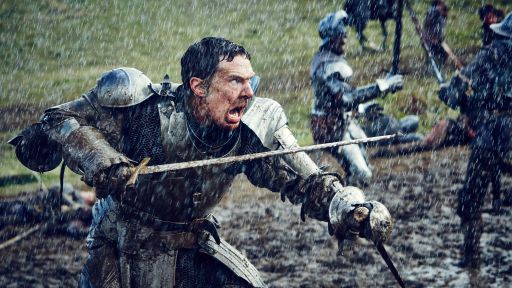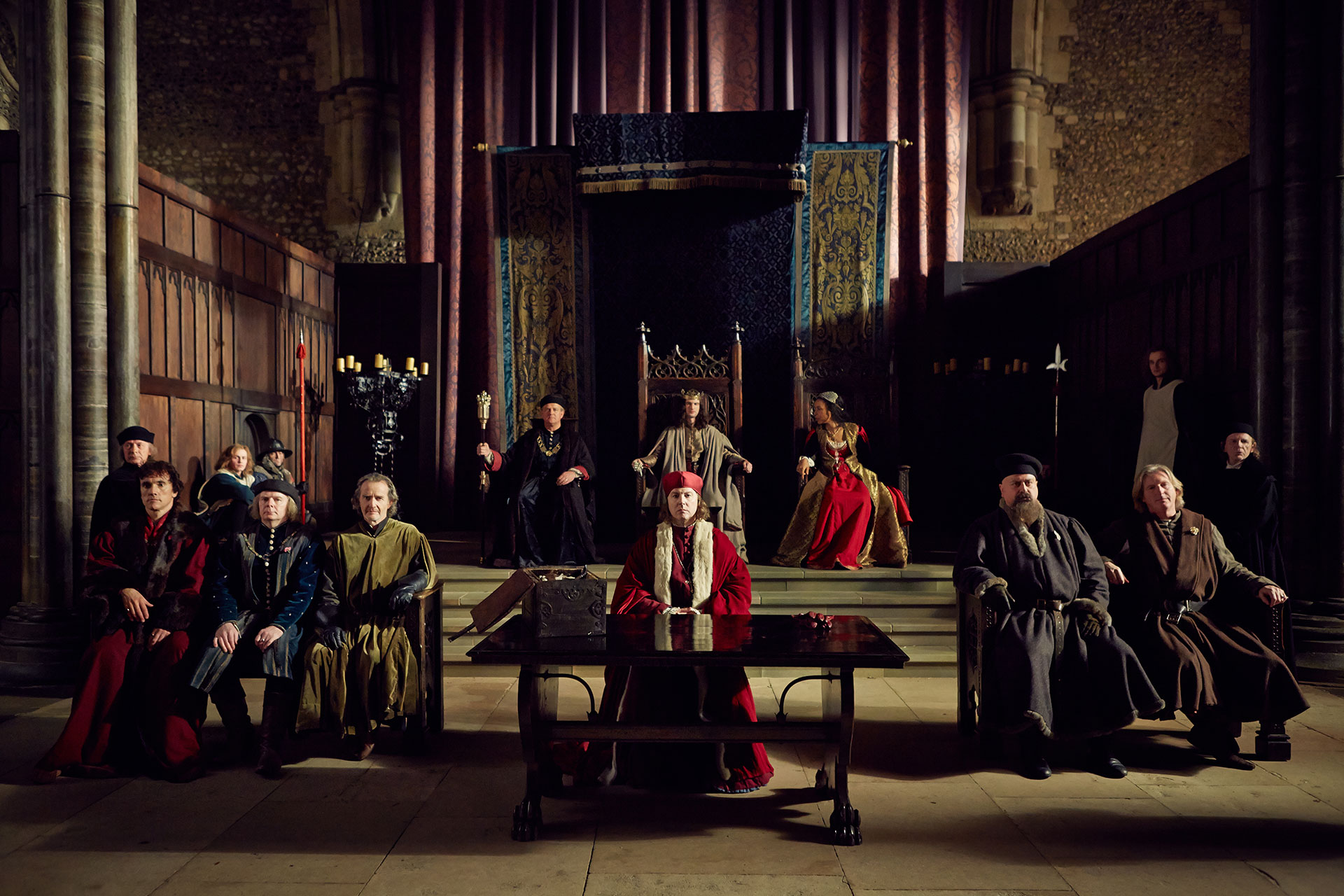
(From l to r) Ben Miles (as SOMERSET), Jason Watkins (as SUFFOLK), Anton Lesser (as EXETER), Hugh Bonneville (as GLOUCESTER), Tom Sturridge (as HENRY VI), Samuel West (as BISHOP OF WINCHESTER), Sophie Okonedo (as MARGARET), Stanley Townsend (as WARWICK) and Adrian Dunbar (as PLANTAGENET) in “The Hollow Crown: The Wars of the Roses Henry VI (Part I).” Credit: Robert Viglasky © 2015 Carnival Film & Television Ltd
What did you think of the first series of The Hollow Crown?
The people gathered around the project were of really high standard. The quality of the acting, in particular, with people like Ben Whishaw, was particularly great. When I got an offer to play Plantagenet, I thought, ‘Oh my God, what a privilege to be involved.’ When I heard who else was in the cast, I was absolutely bowled over, because there’s so many wonderful, wonderful actors involved in this piece.
I’ve been lucky enough to do a tiny bit of Shakespeare onstage over the years. The chance to get involved with the language once more has been incredible. It has stimulated my interest in Shakespeare once again, so it’s been a win-win all round.
Had you read any of these plays before?
Richard III I knew, of course, but I hadn’t known the Henry plays. This is a much more political play, and it involves politics as we understand it. It’s been fascinating to watch the interaction of Gloucester and Eleanor, and interesting to see how Shakespeare portrays Henry VI in particular. Sadly for me, I don’t carry on through the series to get involved with what my son, Richard III, gets up to. I end up with my head on a spike prior to that!
What’s your impression of the characters?
I see these people as savage nobles. They don’t take any slight lightly. Although the Lancastrians might be a little more slick and politic, the Yorks are very much like we imagine Yorkshire men to be. When they believe they’re right, they believe they’re right.
In Shakespeare, the moral balances are very fine. Tom Sturridge is doing some of the most wonderful acting in portraying what’s essentially not a particularly attractive character, but allowing us to see how that seeming weakness can be effective. Shakespeare has done a fabulous job of showing us how things can transpire, and how horribly, absolutely ruthless these people can be in pursuit of power.
Tell us about the iconic roses scene in Henry VI.
Shakespeare has imagined how the Wars of the Roses started. Somebody that day was wearing a white rose, and somebody else wore a red rose to separate the sides. Shakespeare’s distilled that wonderfully and turned it into a theatrical event. I think the Wars of the Roses are still very alive in the English imagination in the roses on footballers’ shirts and so on.
People are very attuned to the period. It is part of the language of cinema. There’s a lot of film out there set in medieval times and so many of the current video games are locked into this period. It’s not extraordinary for us to see people in chainmail and swords. It’s part of our language.
In terms of accessibility, people won’t feel threatened. The delivery of the language is very naturalistic, although you can’t be completely naturalistic for something that’s heightened realism like Shakespeare.
How helpful is it to you to look at the real history of the events in Henry VI?
How do you get hold of the real history? That’s an important question. Shakespeare was very political, but he was also a fabulous entertainer. That’s where his genius comes in as a playwright. As for the history itself, all countries are built on myth. Myth is sometimes more important than history.
Tell us about the battle scenes. What can audiences expect?
I think audiences can expect a level of reality from the battle scenes. They are realistic and gory. It’s going to be quite shocking. People chop people’s heads off. They didn’t stop with just that. They’d bring the head to show people they’d actually kill them. They didn’t have Polaroids!
It’s tremendously tiring if you’ve got armor on and a huge sword, and you’re wandering about trying to fight. The armorers explained to us that if you fall over in armor, you need somebody to help you to get up. Otherwise you’re just stuck on the ground. They used to employ these quick, fleet-footed young boys to run onto the battlefield and stab the knights who fell and couldn’t get up through the gaps in their armor.
What’s it like working with such a stellar cast?
You’ve got to bring your A-game to the set. It’s a Premier League team. It’s also very much an ensemble piece, so you feel a big sense of responsibility to get your parts right so that everyone can bounce off you and feed off your energy. As Plantagenet, I have to do that quite a lot of the time. It has been a huge sense of responsibility.
You feel very lucky to be involved, you really do. I filmed a scene where Mortimer, played by Michael Gambon, dies and tells me that I’ve got a claim to the throne. Acting the scene is going to be something I’m going to remember forever as an actor. These things don’t come along every day.
Is it helpful to film on location?
Costumes and setting are more important in a production like this than practically anything, unless you’re shooting sci-fi. There are real stone walls of two or three feet of stone. You can feel it. People speak, and the sound is really incredible, because it’s picking up the actual bounce off actual stone walls.
Will The Hollow Crown: The Wars of the Roses open Shakespeare to a new audience?
A modern or younger audience will find the series accessible. That’s because the medieval period is so prevalent in the vocabulary of the cinema. I think the show is pitched perfectly for the present day.
On top of that, we have these incredible interesting stories with fascinating moral dilemmas and brutal people. There’s no brutality like medieval brutality. You can’t believe the levels of horror to which they will stoop, only to blithely move on. At the age of twelve, thirteen, fifteen, they’re making decisions about their lives and being betrothed. By the age of twenty you’ve been in two or three wars and seen death and destruction everywhere. There’s an incredible intensity of life lived at a heightened level. That’s going to come across as well. People will be going to bed happy that we’ve got a nice little democracy going on, rather than dealing with these savage nobles!

